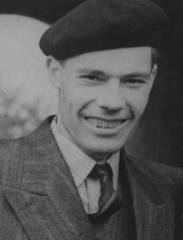

Dunning's History Now
Cameron's Story
Cameron was born in 1918, the youngest son of Mr. and Mrs. John Walker, blacksmith, Smiddy Close, Dunning. After leaving school he served his time as an apprentice with David Wilson, a Dunning joiner. Cameron was a grand footballer, playing first for Dunning Heather as a juvenile, then with Scone Thistle as a junior. He may well have gone far in football if the Second World War had not intervened.
On finishing his time as an apprentice, Cameron went to work on the building of the aerodrome at Scone. Whilst there he was conscripted into the Army in September 1939. After doing his training at the Barracks in Perth he was posted to the Black Watch Battalion and sent to France with the B.E.F.

Cameron on his return. |
When the Germans overran France, the Black Watch fought a rear guard action at St. Valery. Sometime in the middle of June 1940, the order was given 'Every man for himself'. Cameron, not wishing to be taken prisoner, headed inland and westward, living off the land and evading capture. When on the move he posed as an Arab from Algeria and encountered many Germans. At last he was befriended by a French farmer and his wife, and stayed with them for over four years. He lived during his enforced stay under the assumed name of Camille Valin. Whether the name of the family was Valin we do not know, but his only living sister thinks it may well have been.
1942 seems to have been an eventful year. That year he developed appendicitis, and on being taken by lorry to be x-rayed, they were stopped by the Germans. The identity cards of all his fellow passengers were examined, but not his. The operation was not very successful and he lived for four months on champagne and water. He must have been very ill at this time because the farmer and Cameron had decided where he was to be buried on the farm. That same year a son was born to the farmer and his wife and he was christened Pierre Cameron after their 'guest'. Also in 1942 someone got word to Cameron's family in Dunning that he was still alive. Once again it is not known how the information managed to get conveyed from occupied France.
When Cameron first went into hiding he could speak very little French. After working in the fields, however, he became a fluent French speaker. So much so that when he was liberated by the Canadian forces in September 1944, they could not believe he was a Scottish soldier. Repatriated to Britain, Cameron made his way home to Dunning.
When he came off the bus in the village, he was standing looking down the Smiddy Close where he had lived. He thought the place had been bombed as all the roofs had fallen in. A local girl who had been at school with him, Sheena Steven, saw him and recognised him. She went and got a family car and took him to Forteviot, two miles along the road. The family had moved there in 1941. Sheena thought that if she took him to the house it would be too much of a shock for Mrs. Walker, so she took him to the smiddy where his father and brother Andrew were working.

The Dunning war memorial |
Cameron, although he looked not too bad, was not a well man. His years of privation had taken its toll. Because of his ill health Cameron had to report to an army hospital in Lincoln. Whether he was operated on there or not, his sister cannot remember. Anyway he was sent back to Bridge of Earn Hospital where he died on the Dec 29th, 1944.
His intentions had been to return to France after the war was over, his words being 'That's my country now'. It also known that Cameron and his adopted family discussed emigrating to Canada when the war was over. Whether they did or not is still to be ascertained.
This is the story of a young man who suffered the horrors and hardships of war, only to die three months after being reunited with his family.
--Charlie Laing, Dunning, 2001